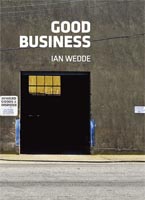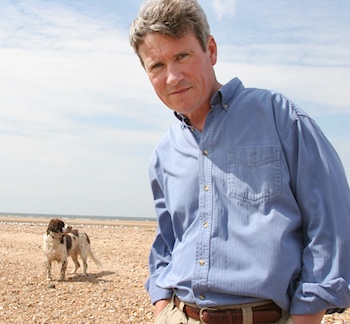
| Jacket 40 — Late 2010 | Jacket 40 Contents | Jacket Homepage | Search Jacket |
This piece is about 4 printed pages long.
It is copyright © Peter Hughes and Jacket magazine 2010. See our [»»] Copyright notice.
The Internet address of this page is http://jacketmagazine.com/40/r-wedde-rb-hughes.shtml
Ian Wedde
Good Business
reviewed by
Peter Hughes
Paperback, 64 pages, ISBN 978 1 86940 442 0, NZD 24.99.

1
The first poem of the sequence ‘Good Business’ is short, wry and modest.
2
Toyota
In mid-March the city fills up with Monarch butterflies.
The red flags of the Toyota sales yards all flap south.
In some way I find it hard to describe
I know it’s always been like this.
3
It’s a nice knot of language which ties and anchors the fleeting present whilst at the same time unravelling itself in acknowledgements of transience and vulnerability. The name of the Japanese car giant is both the title and, pretty much, the centre of the poem. It dominates the piece, more enduring than the migrant butterflies and the descriptive powers of the poet. The first line flutters with a significant ambiguity. The simple present tense doesn’t tell us quite whether the city fills up with Monarch butterflies in mid-March every year, or just this year. And although we’re told the Toyota flags flap south, as a bird or butterfly might, we know they do not. They just flap towards the south but stay where they are. A gap and pause follow this dilemma before we reach the second half of the poem. This is how things are, though it’s difficult to say how or why. But what does “like this” mean? The delicate shifting of the butterflies has Toyota on either side. Does this pose a threat? The butterflies arrive in mid-March this year, but do they and will they always? Perhaps it is this state of fragility which has “always been”.

Ian Wedde, London, 2009, photo by Oliver Read
4
The casual tone and rhythms of informal speech present an attention that flickers over the specifically local. Perhaps this migrated into New Zealand poetry (and that of the U.K.) from the U.S.A. during the 1960s, refreshing modes of writing which had become rigid and academic. These days, of course, it’s a style that has taken over the international mainstream, filling magazines with flaccid anecdote. But Ian Wedde knows how to keep it vital. The ‘Good Business’ sequence (but not the whole book) is dedicated to the poet’s late father and is infused with an almost classical gravity. The sequence reflects on a range of local (Wellington) businesses, some of which seem on the brink of extinction. The only exceptions are multi-nationals such as Toyota and Kentucky Fried Chicken, where new branches open and whose flags fly high. The last poem of the ‘Good Business’ sequence is called ‘CO Products Ltd’ and it brings together themes which have surfaced throughout the piece. Wedde caresses the slightly uneven table he made with his son with the help of his late father’s tools. The table is treated with wood oil from the CO Products of the title, but the company has now followed the poet’s father into extinction. There are just a few drops of oil left in the one remaining bottle:
5
The good business
that filled its 300ml bottles with inexhaustible fragrance
has closed its doors at last, and the finger-width of oil
that remains in my hoard
will now be eked out
along with the time in which to buff up a lasting shine.
6
The 12-poem sequence ‘Good Business’ is only one part of the 35-poem book which kicks off with a delicious Epithalamion. This has some fun with Edmund Spenser’s 1595 version but, unlike Edmund’s, manages to include ‘orange orangutans dishevelled by embracing/ Julia Roberts’ and the irresistible conclusion:
7
Thank you Professor Galdikas
for getting Julia together with the pouty apes, and thank you
Edmund, Ben, John and Gerard, you’ve been
the subwoofers in my wedding song. But listen, now, this is for you
alone, my chopstick-clicking jungly lunch bed-mate, travelling
on foot and by primitive boats called kloktoks we’ve
arrived and leap together the dewy leaves among.
8
I think in the circumstances that final word is my favourite word in the book, though there were two other contenders. One is ‘paddling’ in the phrase ‘ventilators paddling sunlight in’ to Metalworx Engineering. The second is ‘battering’ to evoke ‘the battering of rotors’ of the Westpac Rescue Helicopter.
9
Not all the poems are set in New Zealand. Bangladesh and France are also venues. I particularly like ‘Trimming the palm tree’ which describes the writer’s trip from Nice to Ventimiglia, after Italy knocked France out of the 2006 World Cup in that game which featured Zinedine Zidane’s infamous head-butt. Wedde says he went ‘just to see the Italian triumph/ with my own eyes’ but the poem turns out to be an exuberant celebration of anti-fascist sentiment.
10
The book ends with another poem in which Wedde demonstrates his knack of vivifying the line with tangibles, and achieving a deep symbolic resonance from an accumulation of deft details and touches. ‘Eating the melon’ is about eating the melon, but it is as much about savouring whatever is left to us of life. Dusk is already falling in the very first line. It’s time to think about dinner — maybe some local fish?
11
But first, the melon! It came to market in a crate
padded with dawn-wet leaves. Lightly smacked
to test the resonance of its succulent hollows
and sniffed for its exhalant ripeness, it’s soon
sliced open so its pinkish sides
glisten with drops of sugar. A squeeze or two
of refreshing lemon, a serving of thin, tanned ham
or a little mound of pungent goat cheese
and this tasty treat’s ready for
the dark place of digestion
12
The darkness outside is meeting up with a darkness inside and is haunted by the spectre of personal extinction, in spite of this holiday setting, and in spite of the smiles of the melon skin, the smile of the family dog, the smile of the sickle moon over the sea. This is a melon worth appreciating because, like us, it won’t last for ever:
13
and whose destination is the black sea-bed
nibbled by blind, coprophagous eels.

Peter Hughes by Jemimah Kuhfeld
Peter Hughes lives on the Norfolk coast. His books include Blue Roads (Salt 2003), Nistanimera (Shearsman 2007) and The Summer of Agios Dimitrios (Shearsman 2009). He runs Oystercatcher Press, winner of the Michael Marks Award for outstanding publisher of poetry in pamphlet form.